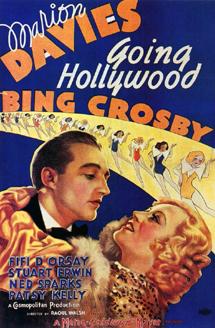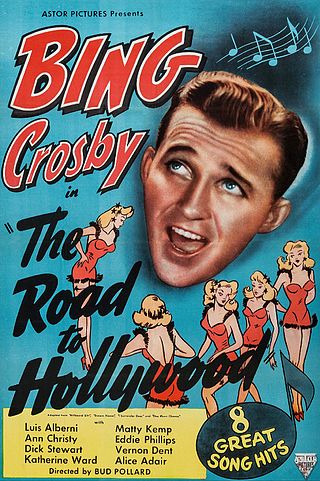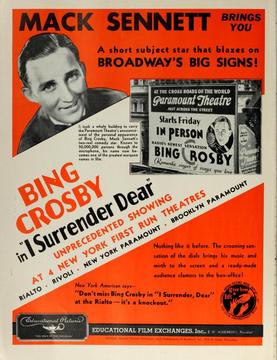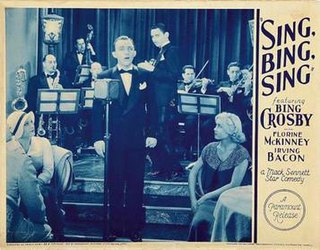"In the Cool, Cool, Cool of the Evening" is a popular song with music by Hoagy Carmichael and lyrics by Johnny Mercer. It was originally planned to feature it in a Paramount film written for Betty Hutton that never took off, which was to be called The Mack Sennett Girl. The song was buried in Paramount's files until it was rediscovered and then used in the 1951 film Here Comes the Groom and won the Academy Award for Best Original Song.
"Prisoner of Love" is a 1931 popular song, with music by Russ Columbo and Clarence Gaskill and lyrics by Leo Robin.
"Just a Gigolo" is a popular song, adapted by Irving Caesar into English in 1929 from the Austrian tango "Schöner Gigolo, armer Gigolo", composed in 1928 in Vienna by Leonello Casucci to lyrics written in 1924 by Julius Brammer.

Going Hollywood is a 1933 American pre-Code musical film directed by Raoul Walsh and starring Marion Davies and Bing Crosby. It was written by Donald Ogden Stewart and based on a story by Frances Marion. Going Hollywood was released by Metro-Goldwyn-Mayer on December 22, 1933.

We're Not Dressing is a 1934 pre-Code screwball musical comedy film directed by Norman Taurog and starring Bing Crosby, Carole Lombard, George Burns, Gracie Allen and Ethel Merman. Based on the 1902 J. M. Barrie play The Admirable Crichton, the film is about a beautiful yacht owner (Lombard) who becomes stranded on an island with her socialite friends, a wacky husband-and-wife research team and a singing sailor (Crosby). The supporting cast features Leon Errol and Ray Milland.

Harry Barris was an American popular singer and songwriter. He was one of the earliest singers to use "scat singing" in recordings. Barris, one of Paul Whiteman's Rhythm Boys, along with Bing Crosby and Al Rinker, scatted on several songs, including "Mississippi Mud," which Barris wrote in 1927.

Sing You Sinners is a 1938 American musical comedy film directed by Wesley Ruggles and starring Bing Crosby, Fred MacMurray, Ellen Drew, and Donald O'Connor. Written by Claude Binyon, the film is about three singing brothers who go to California to find their fortune. Initially the film was to be titled "The Unholy Beebes" and then "Harmony for Three" before finishing with "Sing You Sinners". Filming took place in April/May 1938 in Hollywood. Race track scenes were filmed at the Pomona Fairgrounds and at Santa Anita using two dozen of Crosby's horses. Sing You Sinners was premiered on August 5, 1938 at the Del Mar racetrack with the New York premiere taking place on August 16.
"Wrap Your Troubles in Dreams" (also known as "Wrap Your Troubles in Dreams (and Dream Your Troubles Away)") is a popular song written by Harry Barris with lyrics by Ted Koehler and Billy Moll, published in 1931.
"Snuggled on Your Shoulder (Cuddled in Your Arms)" is a popular song with music by Carmen Lombardo and lyrics by Joe Young, published in 1932.
"Between the Devil and the Deep Blue Sea" is an American popular song published in 1931, with music by Harold Arlen and lyrics by Ted Koehler, and first recorded by Cab Calloway in 1931. It was introduced in the 1931 Cotton Club show Rhythmania and is now a widely recorded standard.

The Road to Hollywood is a 1947 American film released by Astor Pictures that is a combination of several of Bing Crosby's Educational Pictures short subjects. The title was designed to draft off Paramount Pictures' "Road to..." film series starring Crosby, Bob Hope, and Dorothy Lamour; Hope and Lamour do not appear in the film.

Here Is My Heart is a 1934 American musical comedy film directed by Frank Tuttle and starring Bing Crosby, Kitty Carlisle, and Roland Young. It is based on the play La Grande-duchesse et le garçon d'étage by Alfred Savoir.

One More Chance is a 1931 Educational-Mack Sennett Featurette starring Bing Crosby and directed by Mack Sennett. This was the second of the six short films Crosby made for Sennett and which helped launch his career as a solo performer. This film is notable for Crosby first singing on film his classic hit "Wrap Your Troubles in Dreams" which is sung to a bevy of giggling overweight Native American maidens who gradually close in on him. He also sings "Just One More Chance" which topped the various charts of the day in 1931.

Out of This World is a 1945 American romantic comedy film directed by Hal Walker and starring Eddie Bracken, Veronica Lake and Diana Lynn. The picture was a satire on the Frank Sinatra "bobby soxer" cult.
This is a list of Bing Crosby songs he recorded twice or more during his career, excluding all of the 1954 re-recordings for Bing: A Musical Autobiography.
"Sweet and Lovely" is an American popular song of 1931, composed by Gus Arnheim, Charles N. Daniels, and Harry Tobias.

I Surrender Dear is a 1931 Educational-Mack Sennett Featurette starring Bing Crosby and directed by Mack Sennett. This was the first of the six short films Crosby made for Sennett and which helped launch his career as a solo performer.

Billboard Girl is a 1932 Educational-Mack Sennett Featurette starring Bing Crosby and directed by Leslie Pearce. This was the fourth of the six short films Crosby made for Mack Sennett and which helped launch his career as a solo performer.

Sing, Bing, Sing is a 1933 Mack Sennett Star Comedy starring Bing Crosby and directed by Babe Stafford. It was the fifth of the six short films Crosby made for Mack Sennett and which helped launch his career as a solo performer.

Blue of the Night is a 1933 Mack Sennett Star Comedy directed by Leslie Pearce and starring Bing Crosby. It was the last of the six short films Crosby made for Mack Sennett and which helped launch his career as a solo performer.












